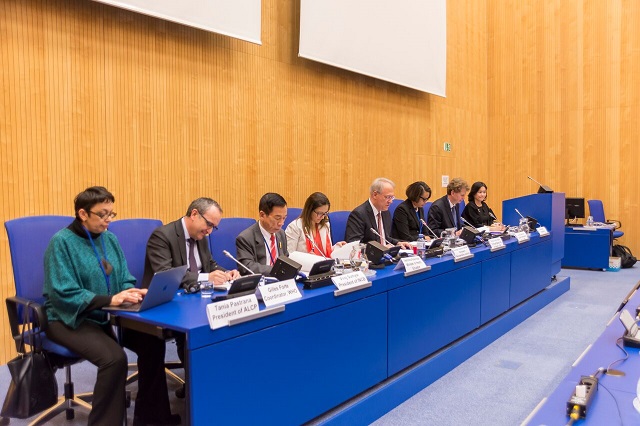Side Event to the 62nd session of the CND: Progress in ensuring the availability of internationally controlled substances for medical and scientific purposes

VIENNA, 15 March 2019 - The key words of the drug control conventions in relation to opioid analgesics and psychotropic substances are clear: these substances are indispensable, should be adequately provided and not unduly restricted. Dr. Viroj Sumyai, INCB President, underlined the importance that the international drug control conventions give to ensure the availability of controlled substances for medical and scientific purposes.
The side-event organized by the Government of Ecuador was opened by Dr. Verónica Espinosa Serrano, Minister of Public Health of Ecuador.
Dr. Sumyai noted that almost 60 years since the adoption of the Single Convention on Narcotic Drugs, the goal of ensuring the availability of and access to narcotic drugs and psychotropic substances for medical and scientific purposes was still far from being universally met.
The INCB President presented the results of an INCB survey on the progress made in implementation of the recommendations contained in the outcome document of the 2016 special session of the General Assembly on the world drug problem and in INCB's 2015 special report on availability. Responses were received from 130 Governments, representing about 78 per cent of the world population, and also from a number of civil society organizations.
Some of the main findings of the survey were:
• In most countries, medical specialists can prescribe opioids or psychotropic substances. However, only a few countries allow nurses to prescribe medicines containing these substances. In many countries that do not have a decentralised health system, the lack of doctors means that it is difficult to obtain a prescription for the necessary medicines.
• Most countries limit the validity of prescriptions for opioid analgesics to one week or less. In many areas where it is difficult to find a pharmacy to dispense the medicine this may translate into an obstacle to obtain the required medicines.
• Countries are taking steps to improve accessibility and many of them are changing their health insurance systems and setting affordable prices.
The President of INCB referred to the supplement to the 2018 INCB annual report entitled " Progress in ensuring the availability of internationally controlled substances for medical and scientific purposes", drawing the attention of the audience to the areas where countries need to make progress to implement the operational recommendations of the UNGASS outcome document in relation to ensuring access to controlled substances for medical and scientific purposes.
These include: training of health care professionals; enabling specially trained nurses to prescribe pain relief medicines; ensuring that prescriptions are appropriate to the needs of patients; offering low-cost palliative care service to patients; mitigating the sanctions applicable in the case of unintentional errors made in the prescribing of controlled substances; bolstering the production of medicines, in their generic forms, in order to increase affordability; reducing or banning advertisement of medical products containing narcotic drugs and psychotropic substances; ensuring that health concerns are prioritized when issuing licences relating to essential medicines; reviewing national estimates and assessments; increasing and strengthening the availability of training for health-care professionals in the use and rational prescribing of controlled substances; expanding the coverage of health services and ensuring that substances in the WHO Model List of Essential Medicines are included in national lists of essential medicines; establishing tools for processing import and export authorizations; and joining the electronic International Import and Export Authorization System (I2ES) developed by INCB and UNODC. These are all specific actions that Governments can take to improve access and availability.
The INCB President concluded by stating that there are clear indications of progress being made in the short time that has passed since 2016, and that Governments have made a commitment to realizing the goal of ensuring adequate availability of and access to internationally controlled substances for medical and scientific purposes. That goal is at the heart of the international drug control conventions, is key to achieving sustainable development goal 3 on health and well-being and should also be at the heart of national drug control policy and practice.
***
